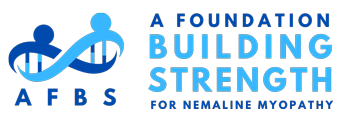In the latest webinar of the series, “Amplifying the NM Community’s Voice”, we were joined by three expert Nemaline Myopathy (NM) researchers from across North America who shared thorough updates on models (or tools) that have been created for use in gene-specific NM research. The progress made by these researchers has been made possible thanks to the generous support of A Foundation Building Strength’s donors.
Watch the full webinar to hear from these researchers in depth on the scientific discoveries and research underway:
Professor Vandana Gupta (Brigham and Women’s Hospital) presented data from her work with NM zebrafish and mouse models of the disease. These models are used because they are small, easy to care for, reproduce quickly, and have disease-causing genetic mutations of NM that are very similar to what we see in humans (99% similarity with mice, 60% with zebrafish). The types of therapies that are being tested in these models include small molecule, modifier genes, and gene-targeted.
Dr. Hernan Gonorazky (SickKids Hospital) presented an educational overview of normal versus abnormal muscle structure and function and then discussed therapeutic strategies targeting the genes that can have mutations causing NM.
Professor Henk Granzier (University of Arizona) presented an overview of the genes that can have mutations causing NM and how various gene-subtypes are classified. His talk reviewed the characterization of nebulin, followed by an in-depth look at the mouse models used at his lab to study what goes wrong when there are mutations in NEB, and possible ways to treat the resulting disease.
We look forward to our next webinar to continue collecting input from the NM community to help guide the future of NM research.
If you are a member of the Nemaline Myopathy community, please take the following action items to support the future of Nemaline Myopathy research:
- Watch the Webinar Recording
- Take the Post-Webinar Survey
Thank you for contributing to the future of Nemaline Myopathy research.
Questions? Feedback? Email us at info@buildingstrength.org.
This project was funded through a Patient-Centered Outcomes Research Institute (PCORI) Eugene Washington PCORI Engagement Award #EACB-23111.

